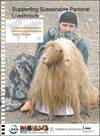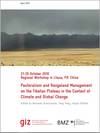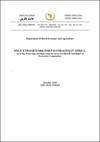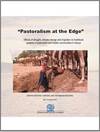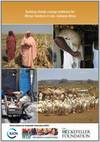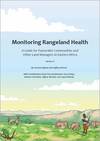Ces directives ont été élaborées afin d’aider les décideurs politiques, pour qui les questions liées au pastoralisme ne sont peut-être pas des préoccupations de routine, à prendre de meilleurs décisions en matière de politiques et d’investissements ayant un impact sur les pasteurs et leurs environnements. Ces directives sont quelque peu techniques de par leur nature, mais elles visent à transformer des questions complexes ou controversées en des éléments de bases plus opérationnels. Elles ont été conçues en vue d’aider les experts en développement et conservation à se familiariser avec les principes sous-tendant le pastoralisme, ainsi qu’avec certaines des opportunités et contraintes liées au développement durable.
Year of publication: 2011Organization: Union internationale pour la conservation de la nature (IUCN)
Topic: Économie, Services environnementaux, Sécurité alimentaire, Régime foncier, Organisation, Participation
Language: العربية, 漢語, English, Français, Русский, Español
Type of document: Technique
Geographical coverage: Global
« Nous, les femmes pastoralistes rassemblées à Mera, en Inde, du 16 au 21 novembre 2010, représentant 32 pays, nous sommes réunies pour renforcer nos alliances et développer des solutions pratiques aux questions qui nous concernent. »
« Nous présentons cette déclaration comme document d'orientation politique afin d'informer et de soutenir le développement de politiques pastoralistes. »
Year of publication: 2010Organization: Auteurs individuels
Topic: Jeunesse et égalité des sexes, Participation
Language: English, Français, Español
Type of document: Politiques et législation
Geographical coverage: Global
The regional workshops within the mountain development programme of InWEnt aim at addressing pressing problems of mutual interest among the participating partners by focusing on a specific topic. In 2010 two conferences on pastoralism were held in the framework of the mountain development programme. Complementing the series that started with the Khorog and Kashgar workshops in July the Lhasa gathering happened to be the final part with a special focus on pastoralism and rangeland management on the Tibetan Plateau. It seems to have been the appropriate timing to emphasize upon a pressing issue that is generating increased and rejuvenated interest in the debates on biodiversity, climate and global change. Planners are challenged by designing concepts for nature protection and resource management in order to implement “green policies”. Decision-makers keep in mind the dual challenges between livelihood improvement and natural resource management by translating and transferring it into modernisation programmes. Far-reaching policies that aim at a reconciliation between ecological necessities and economic demands are tested and implemented in a grand design. Especially the Tibetan Plateau is an arena where the term eco-shelter has become a specific meaning that is affecting the reconciliation between nature and society as well as leading to far-reaching transformations in settlement structures and economic strategies. Recent interventions have changed and modified pastoral practices, terminated and extinguished certain traditions and opened-up new hitherto unknown and unexpected opportunities for pastoralists on the Tibetan Plateau. On the vast Tibetan Plateau pastoralism and rangeland management are not only challenges for regional planning, both sectors offer a tremendous economic potential and are proof for the adaptive properties and resilience of pastoralists exposed to harsh environmental conditions and all kinds of changes.
Year of publication: 2010Organization: Auteurs individuels
Topic: Changement climatique
Language: English
Type of document: Technique
Geographical coverage: Asie centrale
The Policy Framework for Pastoralism in Africa is the first continent-wide policy initiative which aims to secure, protect and improve the lives, livelihoods and rights of African pastoralists. The policy framework is a platform for mobilizing and coordinating political commitment to pastoral development in Africa, and emphasizes the need to fully involve pastoralist women and men in the national and regional development processes from which they are supposed to benefit. The framework also emphasizes the regional nature of many pastoralist ecosystems in Africa and therefore, the need to support and harmonize policies across the Regional Economic Communities and Member States.
Year of publication: 2010Organization: Bureau interafricain pour les ressources animales (AU-IBAR)
Topic: Sécurité alimentaire, Peuples autochtones, Organisation, Participation, Services sociaux
Language: English
Type of document: Politiques et législation
Geographical coverage: Afrique du Nord, Afrique occidentale, Afrique centrale, Afrique orientale, Afrique australe
The purpose of this paper is to review demographic trends as well as settlement and service provision patterns using quantitative data, where possible, and drawing on experiences, evidence and lessons from the Horn and East Africa regions. It addresses some of the most salient issues around pastoral livelihoods, emphasising the need to improve understanding in efforts to promote the resilience of these livelihoods. This study recognises the complexity of the issues and does not aim to provide answers, but rather to highlight issues and pose questions that policy makers, politicians and other key stakeholders need to grapple with in order to put into practice measures to reduce risk and mitigate vulnerability.
Year of publication: 2010Organization:
Topic: Résilience, Services sociaux
Language: English
Type of document: Technique, Scientifique
Geographical coverage: Afrique orientale
This study examines the effects of climate change, drought and decreasing natural resources
amongst mobile populations, specifically pastoralists in the North Eastern and North Rift Valley provinces of Kenya. The study provides an evidence base and proposes programmatic interventions that would be implemented in collaboration with the regional governments and other key players to address conflicts over resources and increased migration to [peri] urban areas.
Organization: Auteurs individuels, Programme des Nations Unies pour l'environnement (UNEP)
Topic: Changement climatique, Peuples autochtones
Language: English
Type of document: Technique
Geographical coverage: Afrique orientale
Renforcement des Capacités de Résistance du Bétail au Changement Climatique en Afrique Subsaharienne
L’étude examine comment le renforcement de la capacité de résistance des systèmes d’élevage en Afrique aux changements climatiques, les investissements actuels pour améliorer les mécanismes d’adaptation du bétail Africain, peuvent-ils améliorer les capacités de résistance des petits exploitants et des éleveurs aux changements climatiques. L’étude a été mise en oeuvre en 2009 à travers deux revues sous-régionales (une en Afrique orientale et australe, la deuxième en Afrique de l’Ouest et du Centre), six visites dans les pays (Kenya, Namibie, Malawi, Cameroun, Niger et Mali), ainsi qu’une e-conférence.
Year of publication: 2010Organization: Union internationale pour la conservation de la nature (IUCN)
Topic: Changement climatique, Innovation, Organisation, Résilience
Language: Français
Type of document: Technique, Politiques et législation
Geographical coverage: Afrique occidentale, Afrique centrale, Afrique orientale
This guide is written for people who want to design and implement a simple rangeland monitoring programme in Eastern Africa. It outlines a series of steps that will enable community members and other land managers to decide what, where, when, and how to monitor, as well as how to interpret and apply the results of their monitoring. The guide introduces a simple set of methods for collecting monitoring data using only a pencil, a stick, and a single datasheet.
Year of publication: 2010Organization: Auteurs individuels
Topic: Régime foncier
Language: English
Type of document: Technique
Geographical coverage: Afrique orientale


